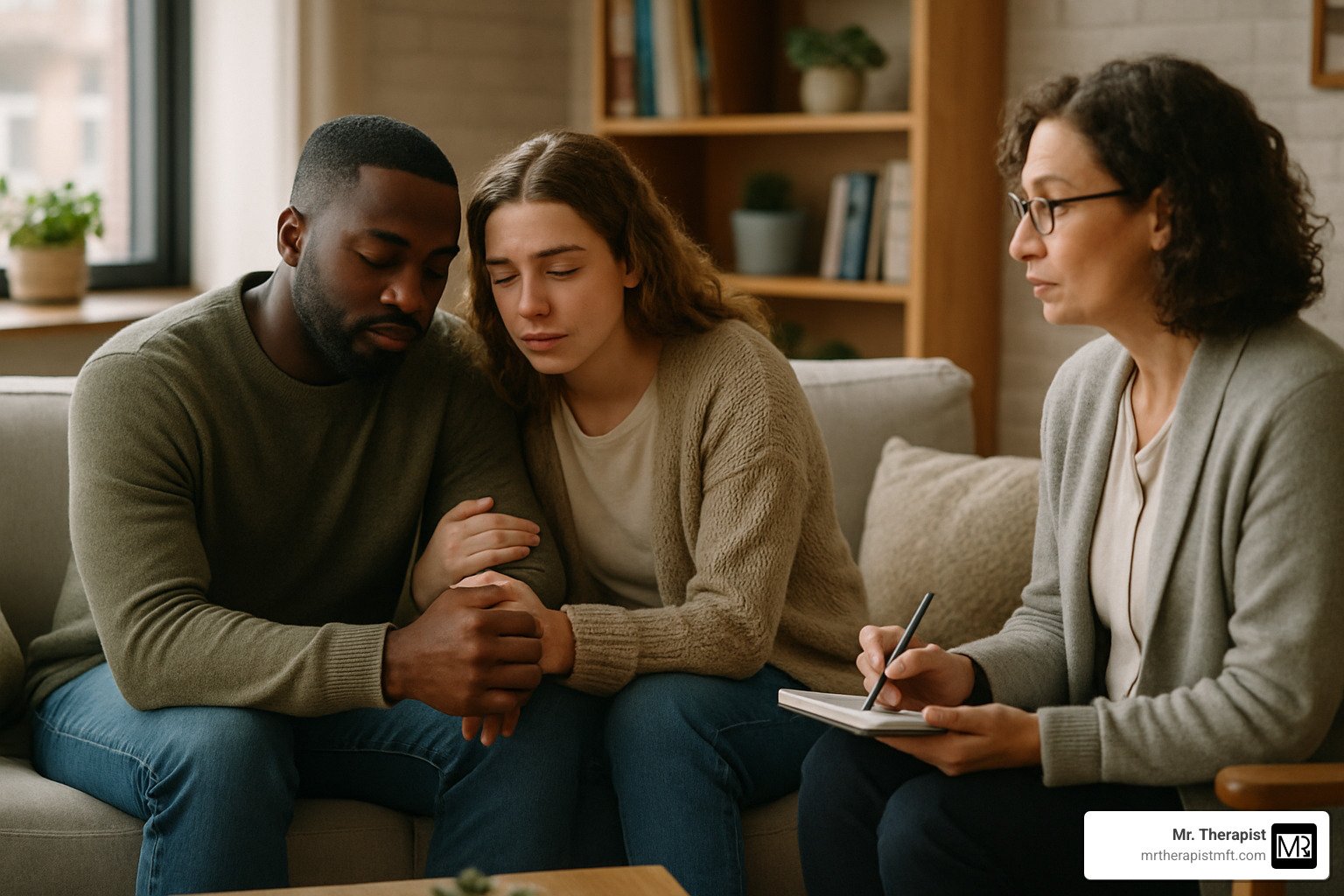
Understanding the Healing Power of Emotion in Relationships
Emotionally Focused Therapy for Couples is a structured, evidence-based approach that helps couples identify negative interaction patterns, access underlying emotions, and create secure attachment bonds. Here’s what you need to know:
- Definition: A short-term therapy (typically 8-20 sessions) based on attachment theory
- Success Rate: 70% of couples recover from relationship distress
- Long-term Results: 90% of recovered couples maintain improvements even 2 years later
- Focus: Transforms negative interaction cycles into secure emotional bonds
- Developer: Created by Dr. Sue Johnson in the 1980s
When relationships falter, it’s rarely about communication skills alone. Often, the real issue lies in emotional disconnection and attachment insecurity.
Emotionally Focused Therapy for Couples views distress not as a sign of pathology, but as a natural response to perceived threats to our most important emotional bonds. As Dr. Sue Johnson explains: “Love, restored emotionally, is a renewable buffer against life’s many stresses.”
Think of your relationship as an emotional dance. When one partner moves away (withdraws), the other often pursues harder, creating a negative cycle that leaves both feeling misunderstood and alone. EFT helps you recognize this dance, understand the emotions driving it, and create new patterns of connection.
I’m Emmanuel Romero, a Licensed Marriage and Family Therapist with specialized training in Emotionally Focused Therapy for Couples, helping partners transform relationship distress into secure, loving bonds through my work at Mr. Therapist Counseling Services and as a clinical supervisor for therapists in training.

Easy Emotionally Focused Therapy for Couples word list:
– EFT therapy techniques
– Emotion-Focused Therapy workshops
– emotion focused couples therapy for trauma survivors
Emotionally Focused Therapy for Couples: What It Is & Why It Works
Have you ever wondered why some relationship issues feel so much bigger than the actual problem at hand? That’s because beneath arguments about chores or schedules often lies something deeper—our fundamental need for emotional connection.
Emotionally Focused Therapy for Couples (EFT) addresses exactly this reality. Developed in the 1980s by Dr. Sue Johnson and Dr. Les Greenberg, this approach has revolutionized how we help couples heal their relationships.
Unlike approaches that just teach communication skills, EFT dives into the emotional bond between partners. It’s a short-term therapy—typically 8 to 20 sessions—but creates deep, lasting change that continues long after therapy ends.
As Dr. Johnson puts it, “The question is not whether we depend on one another, but how we depend on one another.” This perspective shifts couples from asking “What’s wrong with us?” to the more healing question: “What happened to our connection, and how can we restore it?”
At Mr. Therapist, we’ve seen couples transform relationships they thought were beyond saving. The beauty of EFT lies in how it honors our innate need for secure attachment while providing a clear roadmap back to connection.
More info about Emotionally Focused Couples Therapy
Core Principles Behind Emotionally Focused Therapy for Couples
The heart of EFT is what Dr. Johnson calls the A.R.E. framework:
Accessibility: Can I reach you when I need you emotionally?
Responsiveness: Can I count on you to respond when I reach out?
Engagement: Do you value our relationship and stay emotionally present?
When these elements thrive in a relationship, partners feel secure enough to weather life’s challenges together. When they’re missing, couples often fall into painful patterns that leave both feeling alone.
Modern neuroscience strongly supports this approach. Brain imaging studies show that our brains actually code secure relationships as safety signals. This explains why relationship distress feels so threatening—our nervous systems respond to disconnection with the same fight, flight, or freeze reactions triggered by physical danger.
Theoretical Foundations & History
EFT stands on three solid theoretical pillars:
First, attachment theory (pioneered by John Bowlby) explains how our early bonding experiences shape our adult relationships. EFT brilliantly applies these insights to adult romantic bonds.
Second, experiential and Gestalt approaches contribute a focus on present-moment emotional experience and authentic expression—moving beyond intellectualizing to real emotional connection.
Third, systems theory recognizes that couples create interaction patterns together. Changing these patterns requires working with the relationship as a whole system, not just individual behaviors.
Since its development in the 1980s, EFT has grown from a promising approach to what many consider the gold standard in couples therapy. The International Centre for Excellence in Emotionally Focused Therapy now trains therapists worldwide, ensuring that couples receive consistent, high-quality help no matter where they seek treatment.
The EFT Roadmap: Stages, Steps, and In-Session Techniques

The journey through Emotionally Focused Therapy for Couples isn’t a mysterious process—it’s a carefully mapped expedition with clear landmarks along the way. Think of it as having a trusted guide through unfamiliar terrain, showing you not just where you’re headed, but how to steer challenging passages together.
This healing journey unfolds across three distinct stages, with nine carefully crafted steps that build upon each other. While every couple moves at their own pace, this roadmap provides both structure and hope when the path forward seems unclear.
Stage 1 – De-Escalation
Most couples begin therapy caught in a storm of negative interactions. The first stage—typically encompassing about three-quarters of the therapy process—is about finding shelter from that storm.
During these initial sessions, we work together to identify and name the negative dance you’ve been caught in. Perhaps one of you pursues with criticism when feeling disconnected, while the other withdraws to protect themselves.
“It was like someone finally turned on the lights,” shared one client. “We’d been having the same fight for years—just with different topics. Seeing our pattern from the outside changed everything.”
The beauty of this stage is the shift from blaming each other to uniting against a common enemy: the negative cycle itself. As blame softens and emotional safety grows, partners can begin exploring the vulnerable feelings driving their reactions.
Stage 2 – Restructuring Interactions
With the negative cycle de-escalated, we move into the transformative heart of the work.
This is where partners learn to voice their deeper attachment needs in ways that invite connection rather than defensiveness. A simple shift from “You never listen to me” to “I feel alone and scared when we disconnect” can completely change how a message is received.
These moments of vulnerability create opportunities for new bonding experiences. When a historically withdrawn partner can respond with compassion rather than defensiveness, something magical happens—what we call “bonding events” that begin rewriting the relationship story.
At Mr. Therapist, we carefully guide these interactions through a process called “enactments,” helping partners respond to each other’s vulnerability with presence and empathy.
Stage 3 – Consolidation & Integration
The final stage solidifies the gains made in therapy and helps couples apply their new understanding to future challenges.
With their newfound emotional connection, couples often find that practical problems become easier to solve. Issues that once seemed impossible—parenting differences, financial decisions, intimacy concerns—can now be approached from a place of security rather than threat.
We help couples practice these new patterns and prepare for inevitable bumps in the road. By recognizing early signs of their old cycle and knowing how to interrupt it, couples develop confidence in their ability to maintain their connection independently.

Key Emotionally Focused Therapy Interventions
Throughout these stages, we use specific therapeutic techniques that make EFT so effective:
Reflecting helps partners articulate feelings they might struggle to name on their own. “It sounds like beneath your anger, there’s a fear of not mattering to her. Is that right?”
Heightening emphasizes key emotional moments, bringing them into sharper focus. “Notice what happens in your body when you say you feel invisible to him.”
Enactment guides partners to express feelings and needs directly to each other, with the therapist providing support but not speaking for either person.
Tracking the Cycle involves continuously helping couples recognize when they’re falling into old patterns, especially as they begin practicing new ways of connecting outside sessions.
More info about EFT interventions
From Crisis to Connection: Who Benefits & Real-World Outcomes

The beauty of Emotionally Focused Therapy for Couples lies in its versatility. Originally created for traditional couples, it has evolved to effectively serve relationships of all kinds. At Mr. Therapist, we’ve witnessed remarkable changes across diverse situations and populations.
LGBTQ+ couples find the same healing through EFT as heterosexual partners do. The research confirms what we see in our practice daily – when we focus on universal human attachment needs, the framework adapts beautifully to all loving relationships.
Couples facing significant life challenges find particular relief through this approach. We regularly work with partners navigating:
Infidelity recovery where the structured approach helps rebuild shattered trust one secure interaction at a time.
Chronic illness stress which can strain even the strongest bonds. EFT helps partners express their fears about the future while strengthening their ability to face health challenges together.
PTSD in military veterans where trauma reactions can severely disrupt connection. We’ve seen powerful healing when partners understand how trauma affects attachment.
Infertility and pregnancy loss which often leave couples grieving separately. EFT creates space for shared vulnerability around these profound losses.
Sexual desire discrepancies become less threatening when viewed through an attachment lens rather than as personal rejection.
Parenting conflicts transform when couples recognize how their own attachment histories influence their parenting styles.
Premarital preparation gives couples a strong foundation before problems develop. Many tell us that understanding their attachment styles was the most valuable gift they received before marriage.
Common Relationship Challenges Addressed
When couples walk through our door, they often believe they simply need better communication skills. What they find is much deeper.
Communication breakdowns almost always signal attachment distress. When Emma and Carlos came to therapy constantly interrupting each other, they weren’t missing skills – they were missing safety. As their emotional bond strengthened, their ability to listen naturally improved.
Trust injuries cut to the core of attachment security. Whether from infidelity, financial secrecy, or repeatedly broken promises, these wounds heal through carefully guided emotional conversations.
Emotional withdrawal often develops as self-protection. We help withdrawn partners understand their shutdown as an attachment strategy rather than a character flaw.
Frequent conflict – whether explosive arguments or icy silence – signals unmet attachment needs. Couples learn to recognize fight patterns as distress calls rather than personal attacks.
Case Snapshot: Healing After an Affair
Michael and Sophia’s story represents a journey many couples take through affair recovery with EFT.
When they first arrived, blame and defensiveness dominated every conversation. Sophia would demand details about Michael’s affair, then shut down in pain at his responses. Michael alternated between shameful silence and defensive explanations.
In our early sessions, we mapped their negative cycle: Sophia’s angry questioning was actually driven by terror of abandonment, while Michael’s withdrawal stemmed from overwhelming shame.
The breakthrough came when Sophia voiced her deeper truth: “I’m terrified that I wasn’t enough for you.” Instead of his usual defensive response, Michael connected with her pain: “I see how deeply I hurt you, and I’m here now.”
Later, Michael shared his own vulnerability: “I felt like I was failing you in so many ways.” This allowed Sophia to see beyond her hurt to his pain for the first time.
Their healing wasn’t instant, but these new, emotionally honest conversations created a foundation for rebuilding trust.
Does EFT Deliver? Research, Success Rates & How It Compares
When couples invest their time and hope in therapy, they deserve to know: does it actually work? For Emotionally Focused Therapy for Couples, the answer is a resounding yes—backed by some of the most impressive research in the field.
Over three decades of scientific studies, including rigorous randomized controlled trials and meta-analyses, consistently show that EFT creates meaningful, lasting change in relationships. The numbers tell a powerful story of healing:
- Approximately 70-75% of distressed couples recover completely
- An impressive 90% show significant improvements in relationship satisfaction
- These gains don’t fade away—they remain stable even 2+ years after therapy ends
Scientific research on EFT effectiveness
What makes Emotionally Focused Therapy for Couples stand out in the landscape of relationship interventions? This comparison helps illustrate the differences:
| Aspect | EFT | Skills-Based Approaches | Insight-Oriented Approaches |
|---|---|---|---|
| Primary Focus | Emotional bond & attachment security | Communication skills & problem-solving | Past relationships & unconscious patterns |
| Typical Length | 8-20 sessions | 10-12 sessions | 20+ sessions |
| Evidence Base | Strong (multiple RCTs, meta-analyses) | Moderate to strong | Limited to moderate |
| Success Rate | 70-75% recovery from distress | 35-50% recovery from distress | Variable/less researched |
| Long-term Results | 90% maintain gains at 2+ years | Higher relapse rates | Variable/less researched |
| View of Conflict | Signal of attachment needs | Skill deficit or incompatibility | Symptom of deeper issues |
Effectiveness of Emotionally Focused Therapy for Couples
What makes EFT particularly powerful? It’s not just one factor but a combination of elements working together.
EFT addresses the heart of the matter—our fundamental need for secure attachment. Rather than just teaching communication techniques, it helps partners understand and respond to each other’s deepest emotional needs.
The approach actively engages emotions rather than staying at a cognitive level. As we often tell couples at Mr. Therapist, “You can’t think your way out of emotional problems.” By working directly with emotions, EFT creates deeper, more lasting change.
The clear three-stage, nine-step model provides couples with a roadmap while allowing flexibility for their unique journey. This structure creates safety without becoming rigid.
Research shows Emotionally Focused Therapy for Couples works across different cultural contexts, with successful adaptations documented worldwide. The universality of attachment needs allows EFT to resonate across diverse backgrounds.
Limitations & Considerations
While we’re enthusiastic about EFT’s effectiveness, we believe in transparency about when it might not be the right fit.
Emotionally Focused Therapy for Couples involves exploring deep feelings, which can be challenging for those uncomfortable with emotional expression. Some partners may need individual support to prepare for this emotional work.
EFT isn’t recommended when active addiction, untreated serious mental illness, or ongoing domestic violence is present. These issues often need to be addressed before couples therapy can be effective.
The process requires commitment from both partners. If one partner has already decided to end the relationship, EFT may not be appropriate.
The effectiveness of EFT depends significantly on the therapist’s training. Working with a certified EFT therapist ensures you receive the approach as researched and validated.
Getting Started with EFT: Sessions, Finding Help, FAQs & Next Steps
Thinking about trying Emotionally Focused Therapy for Couples? You probably have some practical questions about what the journey looks like. Let me walk you through what you can expect when beginning this transformative process.
Most EFT sessions run between 50-90 minutes, with many therapists recommending the longer 75-90 minute sessions for couples work. This extra time creates space for both partners to dive deeper into emotional experiences without feeling rushed.
In the beginning stages, weekly sessions provide the momentum needed to interrupt negative patterns. As you progress, your therapist might suggest spacing sessions further apart to practice your new skills in daily life.
While EFT is considered short-term therapy, most couples complete the process in 8-20 sessions, with about three-quarters of that time focused on the crucial de-escalation stage.
At Mr. Therapist, we offer both in-person sessions at our San Clemente location and secure video sessions for couples throughout California. Research shows that EFT can be effectively delivered online when in-person meetings aren’t possible.
More info about Emotionally Focused Therapy Near Me
What Does a First EFT Session Look Like?
Your therapist will begin by gathering information about your relationship story—how you met, key milestones you’ve shared, challenges you’ve faced, and previous attempts to resolve current issues.
Even in this first meeting, your therapist will start identifying your negative interaction pattern, helping you see how you get caught in repetitive cycles that leave you both feeling misunderstood and alone.
Together, you’ll discuss your hopes for therapy—what a successful outcome would look like for both of you. Your therapist will explain how the EFT approach can help you reach those goals and answer any questions about the process.
Many couples report feeling a renewed sense of hope after just one session. Simply having their struggles normalized and framed in a way that doesn’t blame either partner can be incredibly relieving.
Finding a Qualified EFT Therapist
The effectiveness of EFT depends significantly on working with a properly trained therapist. Here’s what to look for when seeking help:
ICEEFT Certification is an important credential to consider. The International Centre for Excellence in Emotionally Focused Therapy maintains a directory of therapists who have completed specialized training in EFT.
Always verify appropriate licensure—ensure your therapist holds a valid license to practice psychotherapy in your state (such as LMFT, LCSW, or licensed psychologist).
At Mr. Therapist, Manny Romero is trained in EFT and committed to providing this evidence-based approach to couples throughout Orange County and via teletherapy across California.
More info about Couples Counseling Orange County
Scientific research on therapist-training
Effectiveness FAQs about Emotionally Focused Therapy for Couples
How long before we see improvement?
Most couples begin experiencing some relief once they can identify and de-escalate their negative cycle, often within the first 3-5 sessions. However, deeper change typically requires completing the full EFT process.
What predicts success in EFT?
Research suggests that willingness to engage emotionally, commitment to the process, and working with a well-trained therapist are key factors in successful outcomes.
Can individual EFT be combined with couples EFT?
Yes, in some cases, individual EFT sessions can complement couples work, especially when one or both partners have trauma histories or significant anxiety that makes emotional engagement difficult.
FAQs about Emotionally Focused Therapy for Couples
What makes EFT different from skills-based therapies?
While skills-based approaches focus on teaching communication techniques, EFT addresses the emotional bond that makes using those skills possible. EFT creates the emotional safety that allows couples to use whatever communication skills they already have more effectively.
How many sessions before we feel relief?
Most couples experience some relief within the first 3-5 sessions as they begin to understand their negative cycle and de-escalate conflicts. However, lasting change typically requires completing the full EFT process.
Can EFT work if only one partner is willing?
EFT is designed as a couples therapy and works best when both partners participate. However, if your partner is reluctant, individual EFT can help you understand your part in the relationship patterns and develop more effective responses.

Conclusion & Call to Reconnect
At Mr. Therapist, we’ve witnessed the transformative power of Emotionally Focused Therapy for Couples in our San Clemente practice and through teletherapy across California. EFT offers more than just problem-solving—it creates a fundamental shift in how partners experience and respond to each other.
The research is clear: 70% of couples recover from distress through EFT, and 90% experience significant, lasting improvement. These aren’t just statistics—they represent real couples who have moved from disconnection to secure, loving bonds.
Relationship distress isn’t a sign that you’ve chosen the wrong partner or that you lack communication skills. Often, it signals that your attachment bond needs attention and care.
Whether you’re facing a specific crisis like infidelity, struggling with ongoing conflict, or simply feeling disconnected, EFT provides a roadmap back to connection. You don’t have to figure it out alone.
We invite you to take the first step toward healing your relationship. Contact us at Mr. Therapist to schedule an initial consultation and begin your journey toward a more secure, satisfying bond with your partner.



